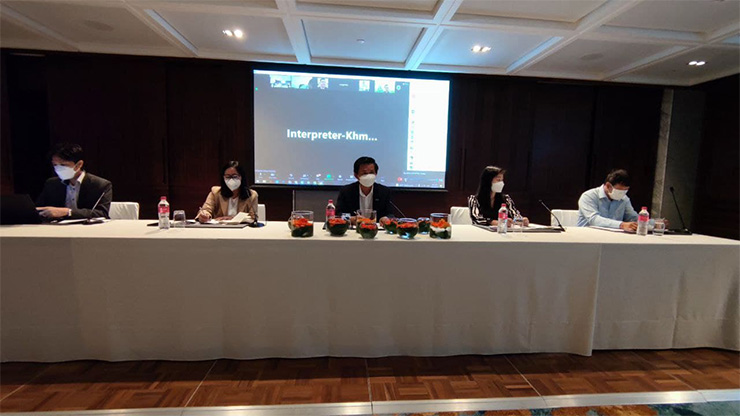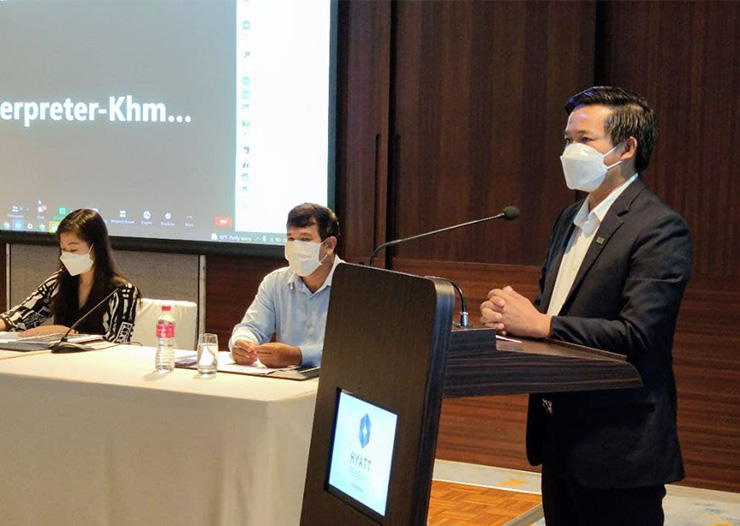
Due to the increasing Cambodian people migrating to abroad for jobs, especially better jobs, a study commissioned by The NGOF and conducted by a consultant team in two sites: Kampong Svay district, Kampong Thom province; and Chetr Borei district, Kratie province. The study report was drafted in September 2021 and circulated for comments. The written comments were incorporated into the draft report and presented to the online meeting held on the 25th October 2021 for further clarifications and comments. The validation workshop was organized with two objectives which are: 1)-to share draft report of assessment on the research study of people migration link to climate change, and 2)- to collect inputs from relevant stakeholders and incorporate into the final report.
There were 52 participants (21 women) from key relevant stakeholders attended the workshop, some of those were online individually, and others in persons, which was held in Hyatt Regency Hotel. In addition, some other participants were joined online from abroad such as Hanoi, Vietnam. The workshop was held during Half a day (Annex 1: Workshop Agenda).
Before starting the validation workshop, several key notes were addressed by key delegates. Those include:

Dr. Tek Vannara, NGOF’s Executive Director: He emphasized that Cambodia, especially farmers of the study areas, have faced with floods, lightning, draughts, which have badly affected the people livelihoods. He emphasized that damage of agriculture due to Climate Change (CC) caused to out-migration of the villagers. Dr. Vannara underlined that ability to cope with CC would keep the rural people to work in their home villages instead of migration, especially unsafe migration. Therefore, Dr. Vannara suggested, Cambodia needed green development and technology transfer in order to improve livelihoods of the local communities. The third aspect is to reduce emission of Green House Gas (GHG) from development, reduce forest degradation, and more conservation, he said. Finding the ways to better CC adaptation and mitigation should be more active in the country and for debate today, he stressed.
Ms. Ngin Navirak, UNDP: Being as one of the responsible people on Small Grand, UNDP, she stated that more than 125 countries worldwide engaged in the program. The grand is to let NGO to closely work with communities to develop the community livelihoods. In Cambodia, the Small Grand started in 2004; and by now, there are more than 240 projects have been implemented including CC, forest and biodiversity. Through implementation of these projects, Ms. Navirak emphasized that there are changes in attitude of the Cambodians from very restricted to more open, e.g. more and more villagers let their daughters to go to schools and find suitable opportunities like migration for jobs. Before ending her welcome remarks, Ms. Navirak encouraged the participants to actively provide inputs on the result of the CC study, which would be presented shortly. For information to the participants, she mentioned that the Small Grand, UNDP Cambodia allocated some budget for NGOF to help further build capacity of target communities.
Mr. Philip, Regional Director of South- East Asia of Rosa Luxemburg Stiftung: He provided his short welcome remarks from Hanoi office, Vietnam (through Zoom), with greeting Ladies and Gentlemen, and highlighting several points include: significant change of Cambodia for last decade, while emphasizing that Rosa Luxemburg stiftung worked on the concept of ecological and social aspects to CC, and happy to collaborate with NGOF, and other, on the CC issues in the future. He ended his speech by hopping to closely work with the participants in the future.
H.E. Dr. Phin Sopheap, Deputy Director of the Prek Leap National Agriculture Institute: He underlined CC as 1) the changes of atmosphere within 30 years that cause biosphere, lithosphere, hydrosphere, and 2) CC impacts on communities (property and capitals like human resources and natural resources). The changes in impacts on human resources are strongly links to migration of the farmers. The study should closely look at this correlation. To him, migration for better jobs in abroad could be good and bad. Dr. Sopheap provided his example of the Philippines people, who live on migration working in abroad, so migration should not be only bad. The most important is high skill workers of the migrants in order to obtain higher incomes. Because of not enough time during the workshop to comment on each point of the study, he encouraged the study to re-think on data scale and its conclusion and recommendations.

For the validation session which was moderated by Mr. Ouk Vannara, NGOF’s deputy executive director, it has been smoothly proceeded after the presentation of the key finding and recommendations of the research study report which was made by the consultant. While the study report was circulated for comments among the participants, there were comments provided by speakers prior to Mr. Bansok’s presentation (Annex 2). Having heard all the previous comments during earlier time of the workshop, Bansok accepted all of them. However, he had short time to present his presentation as following:
Literature reviews: While studying literature of the existing policies and previous studies related to the research topic, the documents conclude that Cambodia is risky to CC for the last three decades such as floods and draughts. The previous studies further show that CC impacts led to migration of the farmers.
Findings of the study: His study found important points as:
• CC definitely caused to migration, because of lack of water for agriculture,
• Chemical fertilizers have been used without control that cause to damages of agricultural lands,
• Government intervention capacity responding to CC have been limited to keep farmers in place,
• Agricultural seeds were not good enough for the current context of CC.
• Knowledge of CC adaptation of the farmers was limited.
Additional comments, made during discussion session, to the existing ones include:
• Provide “definition of migration” either in the country or in abroad.
• Impacts of CC and how (causes of) migration to farmers should be provided in the study sites.
• Provide pre-migration measures to cope with the migration.
• Should divide the study by scope in short period of study time;
• For now, the study should provide only short-term findings, but not to claim for the country representation.
• Migration and Institutional supports: Your recommendations should be classified for government, NGO, communities, and private sector.
• What are the different impacts by CC between the study regions (mostly water areas) and other non-water regions? Maybe the scope areas and time frame were limited.
Finally, Mr. Sam Sovann, Chairperson of NECA Steering Committee, Kratie province, provided key points during his closing remark. He stated that for the meeting day, the meeting was actively discussed on CC and Migration. All comments are accepted for the study team to incorporate them into the document. We would like to see the document will be useful for future uses. He recommended that all stakeholders, e.g. from Prime Minister to Village Heads, to take CC into more consideration, as Covid-19 concerns. Migration and agriculture: nowadays agriculture no more use cattle for labor, benefits from agriculture have been lower than migration jobs. But migration should be safe. So, the study team should include this aspect to the study. He closed the meeting by saying to this human generation to leave the good planet for the next generations! And he wished all the participants healthy before declaring the workshop closed.